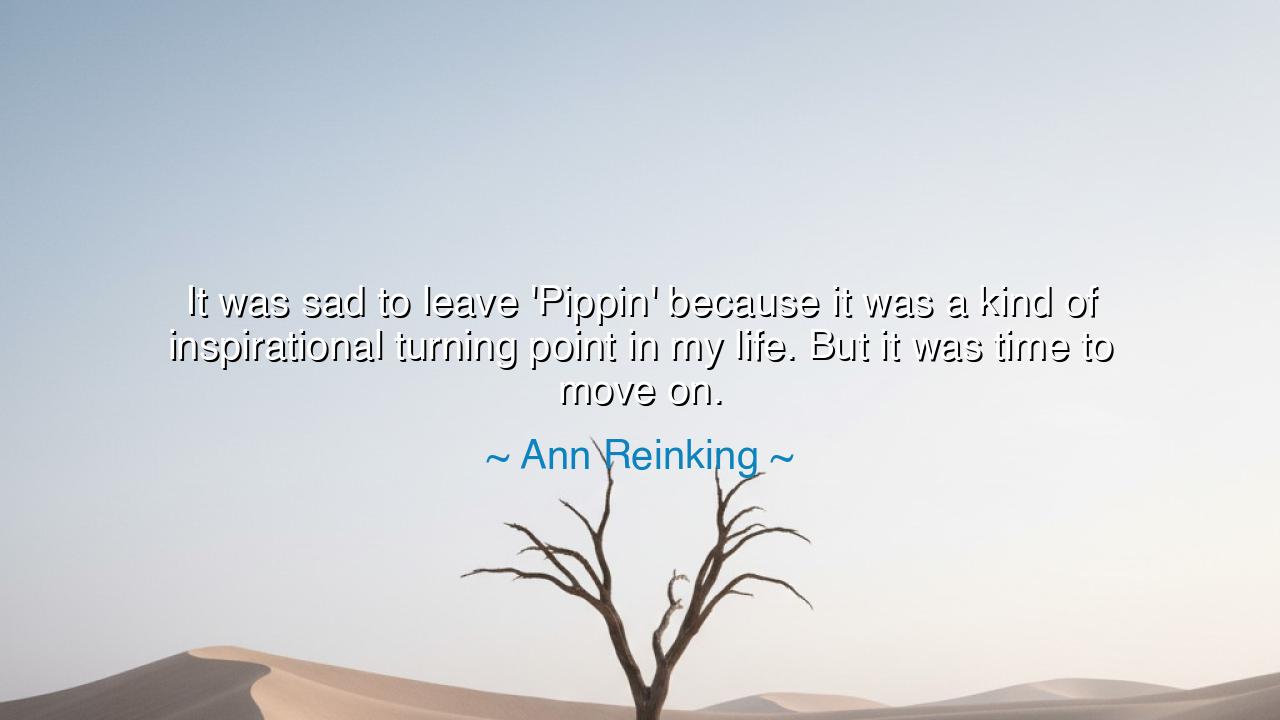
It was sad to leave 'Pippin' because it was a kind of
It was sad to leave 'Pippin' because it was a kind of inspirational turning point in my life. But it was time to move on.






There once was a woman whose dance carried the fire of the stage — Ann Reinking, muse of motion and music, who breathed life into every step she took. When she spoke the words, “It was sad to leave ‘Pippin’ because it was a kind of inspirational turning point in my life. But it was time to move on,” she offered more than reflection; she offered a teaching for all who journey through the cycles of creation, loss, and renewal. In her voice was the eternal song of change — the melody that has carried humankind through every age of transformation.
To understand these words is to see that even the most radiant moments of life must fade, for the river of time flows ever forward. The dancer cannot hold the same pose forever; the note cannot linger past its breath. Reinking spoke of sorrow, yes — the ache of parting from something beautiful — but within that sorrow lay the whisper of growth, the quiet acceptance that every ending births a beginning. The ancients would have called this the wisdom of impermanence: the understanding that to cling to what once was is to turn away from what might yet be.
In the story of her departure from Pippin, one feels the pulse of all great transitions — the leaving behind of a sanctuary that once felt like home. That production, with its songs of purpose and the youthful search for meaning, mirrored her own artistic awakening. It was her turning point, her chrysalis. But the cocoon must always break, else the butterfly will never soar. And so, though her heart wept to leave, she stepped onward into the unknown — guided not by comfort, but by destiny’s quiet call.
History too remembers others who have faced such crossroads. Alexander the Great, after conquering Persia, once stood at the banks of the Hyphasis River, his men weary and unwilling to march farther east. Though he burned with vision, he knew that to force the journey would break the very spirit that had carried them thus far. And so he turned back — not in defeat, but in wisdom. He understood what Reinking understood: that every triumph has its moment to end, and that true greatness lies in knowing when to move on.
There is a sacred grief in progress. To grow is to shed — to leave behind the roles, the places, and even the versions of ourselves that once defined us. Like a dancer bowing at the close of her performance, we must honor what has been, even as we prepare to face the silence that follows. For in that silence, life begins to compose its next act. Reinking’s farewell to ‘Pippin’ was not an exit from art, but a passage into deeper mastery — a renewal of purpose beyond the stage.
So too, each of us will face moments when the heart whispers, “Stay,” but the soul answers, “Go.” To ignore that call is to trap ourselves in the echo of past glories. To heed it is to walk the path of the brave — those who trust that what lies ahead, though unseen, is worthy of faith. The ancients would say: the phoenix burns not out of despair, but out of devotion to rebirth.
Let this be the lesson for all who hear: do not fear the leaving. When the chapter closes, bow with gratitude and walk forward with courage. Cherish your turning points, for they are the gates through which destiny ushers the next season of your becoming. Every inspirational moment, every creation, every triumph — they are but steps in the great dance of becoming who you are meant to be.
Thus, when the time comes to let go — of a place, a role, a dream — do not mourn too long. Instead, honor the beauty of what was, carry its rhythm in your heart, and step into the new music awaiting you. For life, like Ann Reinking’s dance, is never about standing still. It is the endless art of movement — the courage to move on with grace, faith, and the fire of renewal burning within your soul.






AAdministratorAdministrator
Welcome, honored guests. Please leave a comment, we will respond soon